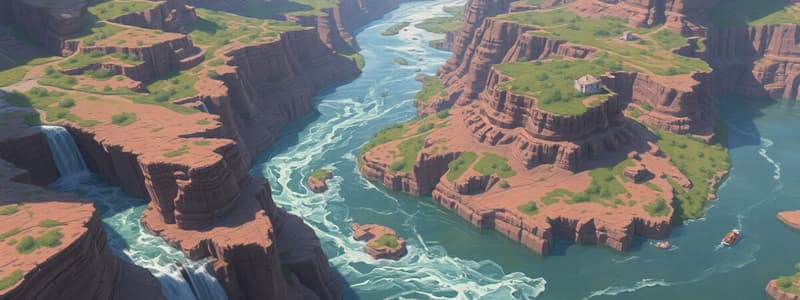Podcast
Questions and Answers
A river consists of a network of _______ in the headwater region, collecting and funneling water and sediment and depositing its load to the basin area through _______.
A river consists of a network of _______ in the headwater region, collecting and funneling water and sediment and depositing its load to the basin area through _______.
- Tributaries, Distributaries (correct)
- Distributaries, Trunk stream
- Distributaries, Tributaries
- Trunk stream, Tributaries
A stream flowing through steep valleys in upland areas debouches suddenly onto a nearly flat valley floor, leading to the formation of _______.
A stream flowing through steep valleys in upland areas debouches suddenly onto a nearly flat valley floor, leading to the formation of _______.
- Flood plain
- Gorge
- Alluvial fan (correct)
- Delta
The Ganges-Brahmaputra delta in India and Bangladesh is an example of a _______.
The Ganges-Brahmaputra delta in India and Bangladesh is an example of a _______.
- Wave dominated delta
- Estuarine delta
- Gilbert delta
- Tide dominated delta (correct)
_______________ is an area of maximum slope and energy in the river, which generally lies on the erosional side of the meandering channel.
_______________ is an area of maximum slope and energy in the river, which generally lies on the erosional side of the meandering channel.
______________ is a very rapid type of downslope mass movement that involves mudflows from volcanic ash.
______________ is a very rapid type of downslope mass movement that involves mudflows from volcanic ash.
When ________ are saturated with water under pressure, they are likely to produce a slippery foundation for any structure, making them unsuitable for civil engineering structures.
When ________ are saturated with water under pressure, they are likely to produce a slippery foundation for any structure, making them unsuitable for civil engineering structures.
Which of these is not a contributing factor to landslides?
Which of these is not a contributing factor to landslides?
Koyna tunnel was excavated through which rock type that has caused rock falls and heavy leakage of water?
Koyna tunnel was excavated through which rock type that has caused rock falls and heavy leakage of water?
The RQD is a modified percentage of the core recovery that incorporates only intact pieces of core that are __________ or greater in length along the core axis.
The RQD is a modified percentage of the core recovery that incorporates only intact pieces of core that are __________ or greater in length along the core axis.
Flashcards are hidden until you start studying
Study Notes
River Systems and Features
- Rivers form a network with tributaries collecting water and sediment, which are then distributed into the basin via distributaries.
- An alluvial fan forms when a stream exits steep uplands onto a flat valley floor, reducing slope and flow velocity, leading to sediment deposition.
Delta Types
- The Ganges-Brahmaputra delta is classified as a tide-dominated delta, shaped significantly by tidal action, featuring distributaries, tidal flats, and mudflats.
Dynamics of River Channels
- The thalweg defines the line of maximum flow velocity and energy in a river, typically located on the erosional side of meandering channels, indicating the steepest gradient.
Mass Movement and Geology
- Lahars are rapid mudflows from volcanic ash, representing a specific type of downslope mass movement.
- Shale, when saturated with water, creates a slippery foundation unsuitable for civil engineering because of its instability under pressure.
Landslide Contributing Factors
- Key factors contributing to landslides include water saturation, unstable subsurfaces, and gravity.
- Cohesive soil is resistant to landslides due to its sticky properties arising from high internal molecular attraction.
Geological Challenges in Tunneling
- The Koyna Tunnel, excavated through basalt in Maharashtra, India, has faced issues of rock falls and water leakage, highlighting concerns associated with different rock types’ stability.
Rock Quality Designation (RQD)
- RQD measures rock quality by representing the percentage of intact core samples that are 10 cm or longer, providing insights into rock mass fracturing critical for construction evaluation.
Studying That Suits You
Use AI to generate personalized quizzes and flashcards to suit your learning preferences.




